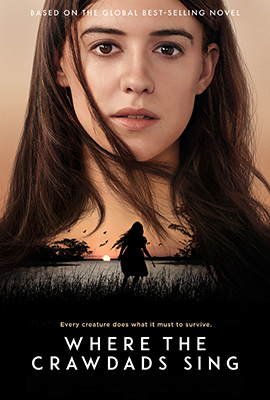Imagine “To Kill a Mockingbird’s” Boo Radley on trial for the murder of his lover and you’ve got “Where the Crawdads Sing,” an eyeroll-inducing romantic melodrama that hinges on your belief that a young girl can raise herself alone in a North Carolina marsh without any interference from the small town who knows she’s out there.
Meet little Kya (Jojo Regina), age around 5, in 1953. She lives with her family in an isolated cabin alongside a marsh waterway in Barkley Cove, NC. We quickly learn her father likes to beat up his family so soon leaves her mother and her siblings who, one-by-one, sneak off while the father’s asleep (or inferred drunk) to leave little Kya to fend for herself. After the father receives a letter from absent Mom and realizes she’s not returning, Dad takes off too. Left alone, what’s little Kya to do?
Industrious even at a young age, Kya wakes up early, fills a bag with fresh mussels from the marsh, and travels downstream to the local bait and gas shop and strikes a bargain with the bait shop owner Jumpin’ (Sterling Macer Jr.).- if Jumpin’s buyin’, he’ll give her 50 cents a bag for mussels. Since we never see Kya eat but hominy grits and canned goods run cheap in ’53, we know she’ll be OK. Plus, Kya’s surprisingly clean cabin has a water pump meaning Kya can keep herself and her clothes clean as well.
Kya blossoms into a comely teen (Daisy Edgar-Jones) with a talent for sketching and drawing shells and insects. She can’t read though, so in steps a boy her age named Tate (Taylor John Smith). Kya and Tate have seen each other around the marsh for years but, now that they’re around “Blue Lagoon” age for adolescent infatuation, they spend a lot of time together. Tate’s a good guy who doesn’t consummate their love but teaches Kya the alphabet so she can read and write. When Tate leaves for college, he vows to return but doesn’t, leaving Kya to fool with dangling participles and a broken heart- it’s around 1966.
Smelling musk within the marsh, Barkley Cove’s resident jock/quarterback/c-sucker Chase (Harrris Dickinson) comes sniffin’ around Kya’s cabin. Rebounding from Tate, Kya’s receptive to Chase’s chase. Chase puts in the time with Kya and gets what he’s come for. Of course, Chase won’t let Kya quit him after Kya discovers Chase has a fiancée in town, so Chase picks up where her Daddy left off by smacking her into submission. Tate returns to Kya and the love triangle is complete.
In 1969, Chase’s dead body is found in the marsh beneath an observatory tower- did Chase fall or was he pushed? The local cops deduce foul play and the coroner pulls red fibers from Chase’s clothes. With rumors Chase was seeing Kya- a.k.a “Marsh Girl” (the small town’s cute nickname for their secret), the cops walk into Kya’s cabin to find a ball of red yarn. The fibers match, though at no time do we ever see Kya wear anything made of red yarn. The cops haul Kya into court to stand trial for Chase’s murder.
That’s the incredulous story “Crawdads” hands you. Usually, solving a murder mystery would keep you interested but, after your brain has thrown up its hands at the countless times logic and reasoning escape “Crawdad’s” story, you’re exhausted. Along the way, better questions arise than was Chase murdered.
Apart from the red yarn we never see used that links Kya to Chase’s corpse, here are some other niggling nuggets:1) the bait shop owners tip Kya off to attend school for a hot meal. Kya attends school for one day before being berated by the other kids. How did she register? Why didn’t social services come looking for her? 2) As evidenced by Mom’s letter, the cabin receives mail but we later find no property taxes have been paid on Kya’s property 3) Kya’s cabin is always in pristine condition- were no hurricanes recorded from 1953-1969 around Barkley Cove, NC?
Any fun to be had with “Crawdads” is picking its nonsensical story apart as I just have. I don’t know if you can make “Crawdads” into a drinking game when it pops up later on cable, doing a shot for every dumb thing you come across, in the same way I don’t know how the novel on which this drivel’s based became a bestseller. Suffice it to say, a Southerner said it best: stupid is as stupid does.

